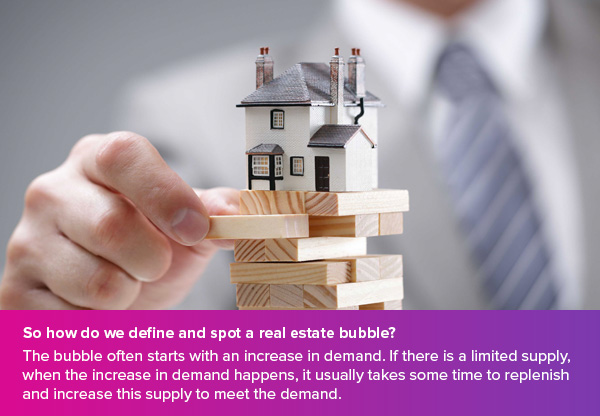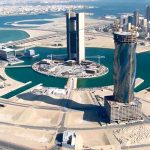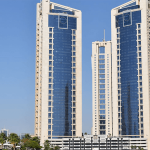Dictionary.com defines a bubble as anything that lacks firmness, substance, or permanence; an illusion or delusion. An economic bubble is defined as an inflated speculation, especially if fraudulent. A financial bubble is when investments in certain assets are bid up to prices that are more than their intrinsic value. So how do you define and spot a real estate bubble?
To spot a real estate bubble you need to firmly grasp what it is first.
So how do we define and spot a real estate bubble?

A housing bubble or a real estate bubble is a buildup in property prices fueled by demand and speculation.
The bubble often starts with an increase in demand. If there is a limited supply, when the increase in demand happens, it usually takes some time to replenish and increase this supply to meet the demand.
Speculators enter the market at this point, raising the demand further.
Now the demand and the supply are going up, this sounds good. But unfortunately at some point the demand often decreases or stagnates while supply is still increasing, resulting in a severe drop in prices. So, the housing bubble suddenly bursts.
By definition, a bubble always bursts, sooner or later. If it does not burst, then it was never a bubble.
How do prices increase?

The laws of supply and demand state that there are two ways for prices to go up, either there is an increase in demand or a decrease in supply.
However, if this happens for unnatural reasons, if the demand increases just because people are speculating, this results in a real estate bubble.
A housing bubble happens when house prices grow to above-average for unnatural reasons such as speculation, or overenthusiastic investing driving house prices above the sustainable average.
Same goes for supply, if supply increases rapidly to meet demand and surpasses it; this means a sudden and rapid growth in supply that drives housing prices down sharply. This results in a real estate bubble
Nonetheless, sometimes houses may be overvalued or overpriced; if at those times supply remains low or increases at a normal pace that should prevent a bubble or a rapid decrease in housing prices.
Stable growth is healthy for the market, so is healthy real estate investment rapid rises and falls never are.
What causes a real estate bubble?

As with all types of economic bubbles, there is a huge debate over whether or not we can accurately spot a real estate bubble, or whether a housing bubble can be identified and predicted, so the causes cannot be firmly stated.
However, studying previous real estate bubbles, the following causes can be detected.
A real estate bubble is usually the result of several factors. For starters, when the economy is doing well, people spend more money on housing. And when there is good credit growth as well.
The problem starts when people are keener to take on debt to buy houses. Low interest rates and loose lending standards are also factors in creating a housing bubble.
Why is a real estate bubble a bad thing?

The previous factors can lead to a lot of speculation and more risky behavior which means there are more people buying houses they cannot afford.
This may also cause a severe rise in home prices, which means that most people cannot afford what they normally or previously could.
So people who are acting sensibly and trying to buy what they can afford are not buying, while people who depend on lenient loans and buying what they cannot afford are.
Moreover, real estate bubbles do not only affect the real estate market, but they also affect the economy at large.
They cause a general lack of affordability, driving more and more people to look for bad mortgage programs. After the bubble bursts, a lot of people may lose their homes and their savings.
What causes a real estate bubble to burst?

First of all, as previously stated bubbles always burst! Hence the name!
Unfortunately though, it is often challenging to identify a real estate bubble until it bursts.
The moment comes sooner or later when the rapid increase of housing supply tumbles over a decrease in demand.
Or sometimes buyers are not willing to pay as much for the homes on the market anymore, so after the consistent home price growth, prices drop drastically and the bubble bursts.








.jpg)
.png)












.jpg)